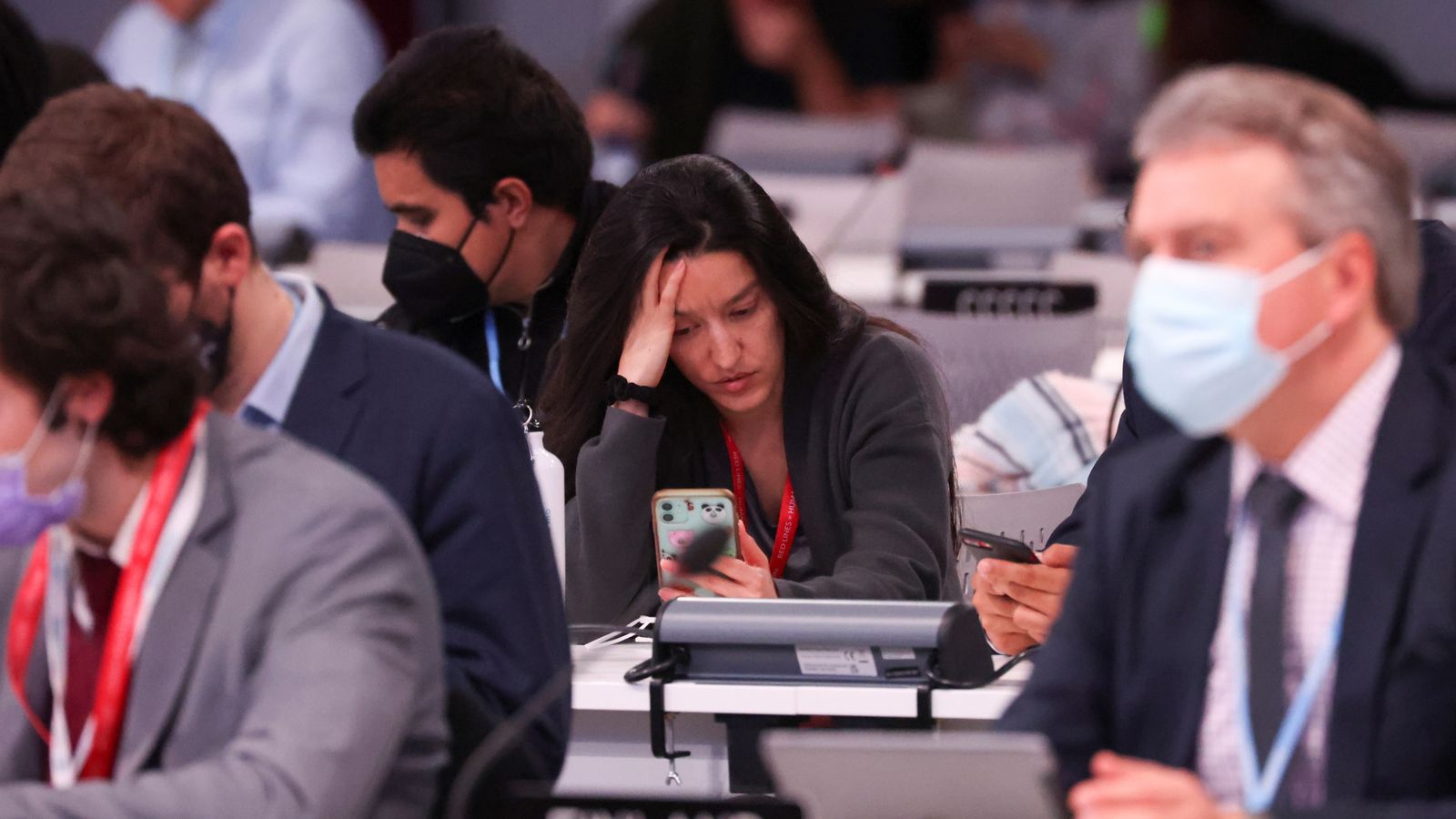The US, EU and Marshall Islands are among nations to have demanded a contested fossil fuel statement lives on in a final agreement from COP26, as the Glasgow talks run into overtime.
A call in the first draft to “accelerate the phase-out of coal and subsidies for fossil fuels” survived a battering in the negotiations, though came out bruised, facing resistance from fossil fuel majors like Saudi Arabia and Russia.
The second draft, published Friday morning, calls upon parties to phase-out of “unabated” coal power and “inefficient” fossil fuel subsides.
As climate envoys aired their views on the latest draft, the EU’s Frans Timmermans said “without these concrete steps our targets will be meaningless”. John Kerry, representing the United States, said “to feed the very problem we are here to try to cure… that’s a definition of insanity.”
Will they reach a deal? Crucial COP talks enter final stretch – follow live
However, neither called for the language to revert to its original, stronger form and the references may yet be watered down further in the final version.
Tina Stege, climate envoy from the highly vulnerable Marshall Islands, said the subsidies were “paying for our own destruction,” saying “all” subsidies must end, not only “inefficient” ones.
COP26: 1.5C target is on life support – next hours will dictate if it survives or not
COP26: Climate activists reported to police after deflating tyres of 4x4s in Glasgow as summit takes place
COP26: Bahamas PM says climate summit has ‘no teeth’ and Boris Johnson’s language doesn’t ‘convey seriousness’ of global warming crisis
The clock has run down on the time allocated for the talks, due to finish at 6pm but now set to run well into the night and beyond.
The UK presidency is desperately trying to bring consensus among the almost 200 nations involved before final agreements can be published.
Meanwhile, China and Saudi Arabia have resisted proposals for countries to ratchet up their climate action plans – known as NDCs – for the period to 2030 by the end of next year.
Sepi Golazari-Munro, director of climate think tank ECIU, accused the pair of attempting to “negotiate the non-negotiable”.
“The science is clear: to keep 1.5C alive, emissions need to be halved this decade,” she said. “But current pledges could instead see emissions rise by 14% in 2030. This is why over 100 countries are calling for an accelerated timetable for increased ambition.”
Laurence Tubiana, a key architect of the landmark Paris Agreement, told Sky News the fact that current plans are “not up to the challenge” is the “main problem we are facing”.
Please use Chrome browser for a more accessible video player
Ms Stege, whose Marshall Islands are slowly being washed away by rising sea levels, said: “1.5C is non-negotiable. “We need to keep returning to the table. We must see 1.5C aligned NDCs and long-term strategies delivered by the major emitters next year.”
Ms Stege also welcomed a new request to “at least double” cash that developing countries send to developing counterparts to help them adapt to the changing climate. Adaptation has long fallen short, angering developing nations which generally have polluted the least yet are least able to cope with the results.
This agreement has been hailed “comprehensive and ambitious” by the UK COP Presidency. After two days of overnight squirrelling away behind closed doors pouring over each turn of phrase and bullet point – finally the “near-final” agreement is here.
It’s significant that for the first time in a United Nations document of this kind, the terms coal and fossil fuels have been mentioned in such explicit terms.
However they are now couched in vague language. An earlier version called for a phase out of fossil fuel subsidies, whereas the new version prefaces that with “inefficient”. This allows wiggle room for nations to continue funding fossil fuel majors.
The fact that ending coal is on the table as an issue countries are willing to be held accountable for is something – but it doesn’t mention timings.
The climate crisis is happening now, and campaigners are calling a clear timeline or deadline for the eradication of coal, as well as an end to all subsidies for things like oil, gas and coal.
Money has been an issue like never before at these talks. This fresh draft agreement “notes with deep regret” that the $100 billion pledged by 2020 has not been met and “urges” it be met “urgently” and increased between now and 2025.
The annual target is due to land on developing nations’ laps finally in 2023 after being delayed already.
The terminology and tone is different in this draft too – some of the “urges” have turned into “requests” for the countries, leaving commentators wrangling over which word is stronger and which allows for more tactical manoeuvring.
But let’s remember the second-draft document is just that: a draft which holds no promises. All 197 parties need to agree on every word and the mood music from the conference today is that everyone is not yet signing from the same hymn sheet.
But Mohammed Adow, who runs climate think tank Power Shift Africa and has observed the Glasgow talks, said the text “largely reflects a COP in the rich world and contains the rich world priorities”.
“The vulnerable countries have been pushing for a loss and damage facility, and the reason is we failed to mitigate enough. We failed to adapt,” he said.
Subscribe to ClimateCast on Spotify, Apple Podcasts, or Spreaker
For full coverage of COP26 watch Climate Live on Sky channel 525.
Follow live coverage on web and app with our dedicated live blog.
Get all the latest stories, special reports and in depth analysis at skynews.com/cop26






















